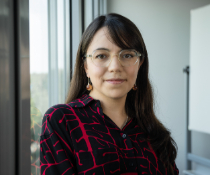
BIGSSS, Universität Bremen
Email:
Unicom, Haus 7, Room: 7.3100
Regular Ph.D. Fellow, Cohort 2021
Research Interests
Emotion work; Emotional labour; Care work; Long-term care; Ageing; Gender inequality; Class inequality; Qualitative methods; Grounded Theory; Latin American research; Feminist studies
Dissertation topic
Emotion work of paid and unpaid caregivers of older adults. A qualitative study in the Chilean and German care regime.
Dissertation abstract
Although the emotion work displayed by caregivers of older adults is recognized in the literature, several authors have emphasized that this dimension of care still needs more attention. Moreover, an aspect that deserves emphasis is the understanding that emotions are not directly caused by situations or events but are mediated by normative reflection that has its correlate at the cultural, social, and ideological level. Nevertheless, much of the literature has addressed emotion management and the costs associated with long-term care from an individual perspective, although some authors have pointed out the risk of ‘over-pathologizing’ the feelings of caregivers. Likewise, the elements, dynamics and mechanisms that interact in shaping emotion work from a macro-level perspective remain unclear, for instance, when considering phenomena such as the commodification of care or the gender order and roles.
Building on Arlie Hochschild’s theoretical foundations on emotion work and incorporating Tonkens’ critique of the study of emotions including the macro-level dimension, this dissertation aims to analyze how emotion work is characterized and configured in formal and informal long-term care in Chile and Germany, each country with particular care regimes. Considering the differences and similarities between Germany and Chile in terms of how long-term care provision is structured and what role different institutions – such as the family, the state, or the market – play in the configuration of particular care regimes, I seek to contribute to the still incipient comparative literature on the topic from two societies of the Global North and the Global South. I also intend to incorporate into the analysis the potential gender and class tensions in the provision of care for older adults in the two countries studied.
This project utilizes a qualitative approach to answer the research question and objectives. Based on the assumption that emotion work will have particular characteristics depending on the relationship of caregivers and care-recipients, and whether this relationship is paid or unpaid, I will focus on informal, family care; and professional, non-family care. To understand the configuration of emotion work and its normative dimension, formal and informal caregivers will be asked to undertake in-depth interviews and use qualitative diaries. Similarly, to characterize and understand how care regimes are configured in Chile and Germany, documentary analysis of the literature in both countries will be conducted. Following the analytical proposal of the constructivist grounded theory, data will be gathered and analyzed in a parallel process. Thus, I aim to generate a comprehensive and multilevel proposal for the case of Germany and Chile with respect to the emotion work performed by caregivers of older adults.
Academic Supervisors
Simone Scherger
Margrit Schreier
Francisca Ortiz Ruiz
